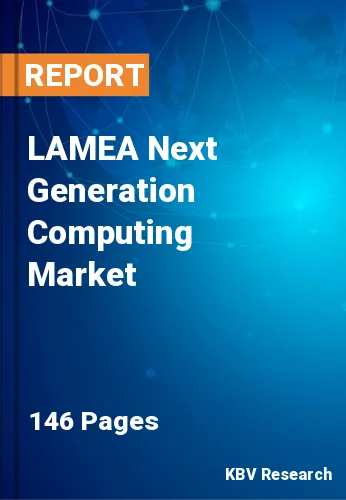The Latin America, Middle East and Africa Next Generation Computing Market would witness market growth of 21.3% CAGR during the forecast period (2022-2028).
Scientists and researchers can use of next-generation computing skills to enhance decision-making and analysis, as well as a simulation support system, to estimate how the investigated object would behave in a real-life environment, as influenced by many physical predictor variables. This saves a lot of time on R&D while also assisting in the development of a higher-quality, more precise product. Without model modelling, which typically comprises complex networks, many geometric elements, and sophisticated physics, this would be an extremely difficult process to do.
However, beginning in 2021, the market is predicted to accelerate due to the rising demand for high-performance computing, which offers benefits such as enhanced computational capacity and the ability to calculate complex algorithms. The expanding prevalence of cloud computing, together with various governments' digitalization ambitions, will play a critical role in propelling market expansion over the forecast period. For example, the government of the United Arab Emirates (UAE), has established digital transformation initiatives such as Smart Abu Dhabi and Smart Dubai. Such projects would stimulate cloud computing usage and increase the desire for Next-generation computing systems.
The African School on Electronic Structure Methods and Applications (ASESMA) is a program aimed at teaching computer modelling to African academics, researchers, and graduate students. The first summit took place in Cape Town, South Africa, in 2008. The ASESMA series will be held every two years, as it was in 2010, 2012, 2015, and 2016. These series are intended to continue through 2020. The series began in Cape Town in 2010 and continued in Eldoret (Kenya), Johannesburg (South Africa), and Accra (Ghana) in 2012, 2015, and 2016.
During ASESMA's many schools around Africa, the Next-Generation Computing supplied computation power and temporary storing to participants. The contribution of CHPC, and even the government of South Africa's continuous support, is greatly appreciated. ASESMA has received support and financing from various hosting African governments and various institutions, resulting in the teaching of one of the biggest groups of African researchers in materials science.
Regional initiatives by groups in various regions of Africa have set up tiny Next-Generation Computing facilities that have enabled local academics and graduate students to participate in simulations of materials of interest and use governmental resources and support from international organizations.
The Brazil market dominated the LAMEA Next Generation Computing Market by Country in 2021, and would continue to be a dominant market till 2028; thereby, achieving a market value of $8.4 billion by 2028. The Argentina market is estimated to grow at a CAGR of 21.9% during (2022 - 2028). Additionally, The UAE market would display a CAGR of 20.9% during (2022 - 2028).
Based on Type, the market is segmented into High Performance Computing, Quantum Computing, Energy Efficiency Computing, Memory Based Computing, Approximate & Probabilistic Computing, Brain Type Computing, Optical Computing, Thermodynamic Computing, and Others. Based on Component, the market is segmented into Hardware, Software, and Services. Based on Offering, the market is segmented into On-premise and Cloud. Based on Organization size, the market is segmented into Large Enterprises and Small & Medium Enterprises. Based on End User, the market is segmented into Government, BFSI & Telecom, Space & Defense, Energy & Power, Chemicals, Healthcare, Academia, and Others. Based on countries, the market is segmented into Brazil, Argentina, UAE, Saudi Arabia, South Africa, Nigeria, and Rest of LAMEA.
Free Valuable Insights: The Global Next Generation Computing Market is Predict to reach $465.7 Billion by 2028, at a CAGR of 18%
The market research report covers the analysis of key stake holders of the market. Key companies profiled in the report include IBM Corporation, Atos Group, Cisco Systems, Inc., Hewlett-Packard Enterprise Company, Amazon Web Services, Inc., Microsoft Corporation, Intel Corporation, Oracle Corporation, Google LLC, and Alibaba Group Holding Limited.
By Type
By Component
By Offering
By Organization size
By End User
By Country
Our team of dedicated experts can provide you with attractive expansion opportunities for your business.

